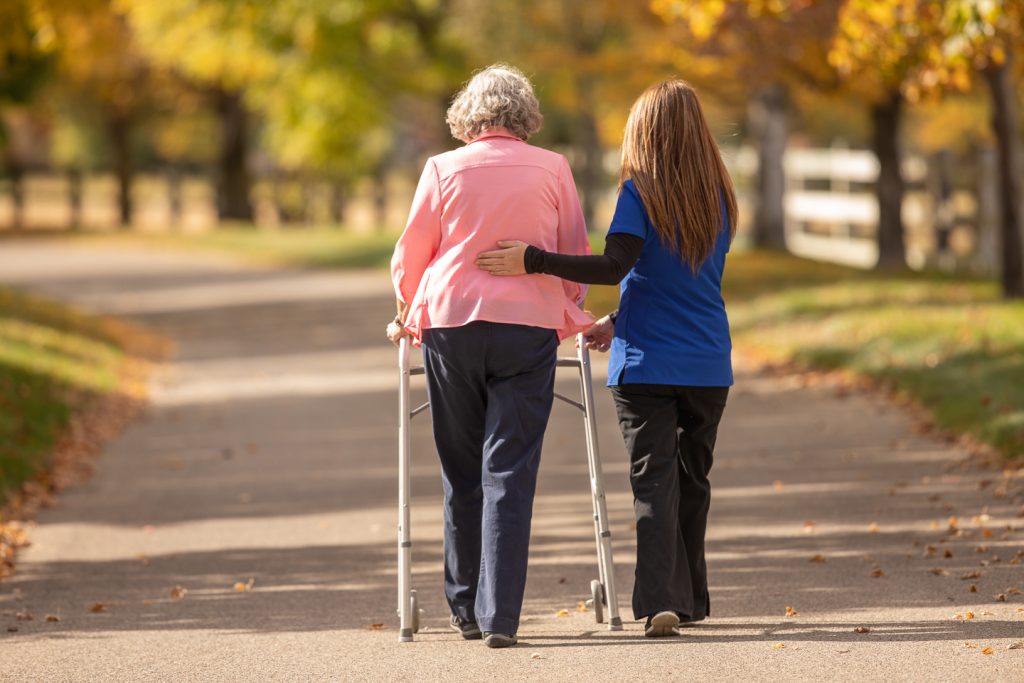
Buildups of the protein tau in brain cells are a hallmark of Alzheimer’s disease. Researchers who recently studied older adults found a link between tau and physical activity levels. Regular exercise has been shown to improve cognitive health, even slowing the rate of cognitive decline.
What is tau?
The tau proteins stabilize the internal skeleton of neurons in the brain. Through a maze of tube-like shapes inside the internal skeleton, nutrients travel to reach different areas of the neuron. An abnormal buildup of tau, which occurs in Alzheimer’s disease, destroys the internal skeleton.
Tau tangles form when abnormal forms of tau protein attach to other tau proteins inside the neuron. In Alzheimer’s disease, the tau tangles, in combination with beta-amyloid plaques (proteins found in the membrane around nerve cells), accumulate and slow an individual’s ability to think and remember.
High levels of tau are associated with cognitive decline, including worsening memory problems and trouble thinking. The results of the Chicago Health and Aging Project studies done on seniors show that physical activity contributes to slowing the development and progression of cognitive decline.
The research focused on elderly people who had high concentrations of tau. The seniors who engaged in average levels of exercise experienced a 58 percent slower rate of cognitive decline in comparison to study participants who reported engaging in low levels of physical activity.
Furthermore, seniors in the study who reported high levels of exercise experienced a 41 percent slower rate of cognitive decline than older individuals who took part in low amounts of physical activity. Even in seniors with low levels of tau, high physical activity levels were linked with slower cognitive decline.
What is the link between exercise and cognitive health?
It is understood that physical exercise boosts bodily health, warding off conditions, like osteoporosis, obesity, and cardiovascular diseases. In recent times, research has been shifting toward understanding how exercise preserves cognition, particularly how it protects seniors from developing dementia.
For example, in seniors without dementia, aerobic exercises are shown to improve cognitive performance. Of the various cognitive functions, executive functions tend to benefit the most. Executive functions include the ability to formulate a goal, develop and execute a plan, and self-correct.
Numerous recent studies show that regular physical activity improves not only executive functions, but also important cognitive abilities, such as attention, cognitive speed, and working memory. Even moderate physical activity is linked with the reduced risk for developing Alzheimer’s disease.
Exercise boosts memory and thinking skills, triggers physiological responses (such as changes to insulin levels and inflammation), and promotes the healthy growth of new connections between brain cells. The endorphins released during exercise also enhance mood and sleep, leading to better cognition.
What types of exercises are most beneficial for cognitive health?
Walking is one of the most accessible forms of physical activities for seniors of all ages and abilities. Aging adults who walk long distances, such as three miles or more per day, are less likely to experience a decline in cognitive abilities than those who walk less.
Seniors who walk three times per week or more, for example, have a 40 percent lower risk for developing cognitive impairment and a 50 percent reduced risk for developing Alzheimer’s disease. Overall, exercise reduces the risks for dementia, cognitive decline, and cognitive impairment.
Alternatives to walking include activities, like dancing, swimming, biking, climbing stairs, and playing tennis. Strength training activities include lifting weights or doing push-ups. Seniors should also engage in flexibility exercises, like yoga and stretching, to stretch the muscles and stay limber.
While a formal exercise routine is advised, seniors can also get in a good day’s worth of physical activity by working in the yard or walking the dog. Rather than take the elevator, climb the stairs. Park farther away from the destination and walk to it. Stretch while watching television.
What is the recommended amount of exercise for seniors?
It is safe for most people aged 65 and over to exercise. This is true whether seniors have chronic ailments, arthritis, high blood pressure, or heart disease. Seniors and caregivers who are unsure about beginning an exercise regimen should discuss their concerns with a physician.
Brisk walking is a recommended form of moderate aerobic exercise. Older adults should aim for 2.5 hours of walking per week, which amounts to approximately 30 minutes on most days. Incorporate one hour and 15 minutes of vigorous exercise, like jogging, into each week.
Caregivers are essential support when seniors lack the confidence to hit the pavement to walk or jog. These professionals accompany elderly care recipients on walks around the block, for instance, to prevent falls and help stabilize the senior. Caregivers also lend motivation.
Similarly, professional caregivers will prepare the senior for the daily exercise session. Caregivers ensure seniors wear comfortable clothing and well-fitting shoes. Be aware that certain types of footwear are specially designed for specific activities, like running, dancing, tennis, or walking.
Your elderly loved one should engage in regular exercise to enhance cognitive performance. Assisting Hands Home Care service providers ensure senior care recipients are healthy as possible. We are also experienced in providing quality memory care to seniors with dementia or Alzheimer’s disease.
Daily responsibilities include the preparation of nutritious meals, grocery shopping, transportation services, medication reminders, and discreet assistance with personal hygiene tasks. We are trained to identify dementia symptoms, such as aggression, wandering, forgetfulness and incontinence, and compassionately support the patient.
Assisting Hands Home Care professionals are excellent companions to seniors with dementia. Living with a progressive brain condition can feel isolating. However, our caregivers build strong bonds with care recipients, getting to know them through conversations and initiating recreational activities.
Whether your loved one is fit or requires mobility support, Assisting Hands Home Care caregivers will fulfill the senior’s nonmedical care needs. Families with aging adults living in Deerfield, Lake Zurich, Lake Forest, Lincolnshire, Vernon Hills, Highland Park, Libertyville, Round Lake Beach, Illinois, are encouraged to call us at (224) 268-9068 to schedule a complimentary in-home consult and start quality dementia care.

















